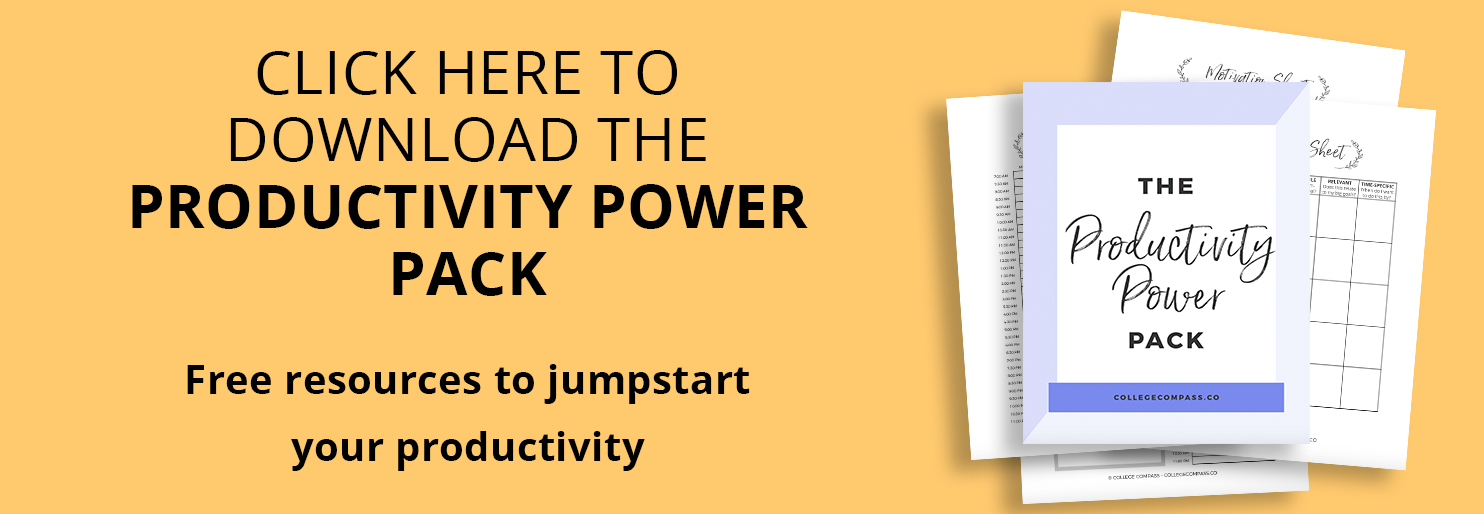One of the biggest challenges students face in college is not being as productive as they’d like. College productivity ultimately comes down focus; if you can focus on what you need to do without distraction you can usually finish that task in a much shorter amount of time. But college is virtually designed to distract us; from clubs, to events, to the call of social media, it’s easy to let your focus slip and to lose sight of why being efficient and productive matters to you. That’s why today, I’m sharing four steps you can take today to improve your focus and your college productivity.
This post comes with a free Productivity Power Pack, which you can download here.

Step 1: Track Your Time
I recommend starting by tracking how you spend your time. Get out a blank week in your planner, or better yet, the time tracking sheet from our free Productivity Power Pack, and keep track of where your time goes throughout the week. This is a great way to see where you’re really spending your time.
Step 2: Get Motivated
Read: The Ultimate Guide to College Motivation
Next, get motivated for boosting your productivity by focusing on why you want to make a change. You could consider writing down reasons you’d like to be more productive, like:
- To waste less time on things that don’t matter
- To spend my time on things that I’m passionate about
- To complete my assignments to a better degree
You can also try a motivation chart. The packet that comes with this post includes a free motivation sheet that can be a great place to start!
Step 3: Set Goals
Next, take some time to set goals for how you’d like to spend your time from now on. I advise people to make SMART goals that are specific, measurable, attainable, relevant, and time-bound, because they’re easier to track and achieve.
When you set a goal for your productivity, try following the SMART model. Instead of aiming to “be more productive”, try something like “work for four hours a day on my assignments, using a worksheet to track my progress, until the end of May.” Once you reframe your goal, be sure to ask yourself:
- Is it specific? What are the who, what, and where?
- Is it measurable? How will you measure your progress?
- Is it attainable? Can you realistically achieve this goal?
- Is it relevant? How does this smaller goal connect to your larger goals?
- Is it time-bound? By when do you want to complete this goal?

Step 4: Budget Your Time
Using the information you gathered in Step 1 about how you spend your time, the motivation from Step 2, and the goals you set in step 3, budget your time. Our Productivity Power Pack includes a worksheet on this!
a. Subtract sleep.
Start with the hours you’d like to be sleeping every night. Students function best when they sleep between 7 and 9 hours a night, and if you want to be healthy and productive, proper amounts of sleep are really non-negotiable. I recommend starting with 8 hours if you’re not sure what your perfect amount of sleep is.
b. Calculate non-negotiables.
Meetings, classes, and other “non-negotiable” items like the hours you work for your job, go next. Figure out how many of these hours you have in a day and subtract that from your daily time budget, as well.
c. Now estimate studying.
Next, subtract the number of hours you’d like to spend either studying or working on assignments each day. This can be a flexible estimate, as the amount of time you need to do your work will differ from day to day!
d. Add in fun!
Finally, add in the fun and overflow items you’d like to have in your day. Don’t skip this! Things that excite you and make you happy are just as non-negotiable as meetings and class times. You’re at your best when you’re happy taking care of yourself!

With these steps in place, you’re at a great point to jumpstart your productivity and focus in on doing the work you need to do while still having fun. But first, let me know:
What makes you more productive?



